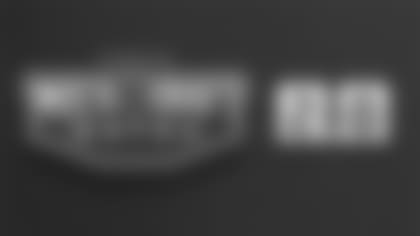Every summer leading up to training camp Buffalobills.com asks 25 of the most pressing questions facing the team as they make their final preparations for the upcoming regular season. With a new regime and practices at St. John Fisher fast approaching, here is the first installment as we closely examine some of the answers the Buffalo Bills have to come up with between July 28th and Sept. 12th.
As the Buffalo Bills begin anew in 2010, it is difficult to predict exactly whom fans can expect to see the biggest impact from. The squad returns a number of veterans at each position that are capable of being successful players under new head coach Chan Gailey. The group that could surprise everyone, however, is the crop of rookies that have been added to the roster since the NFL Draft. While these players may not bring professional experience to the table when training camp opens July 29, these individuals bring a unique skill set to the Bills franchise, and any one player could be a breakout performer in 2010.
The draft selection with the biggest expectations is often a franchise's first overall pick each year. In Buffalo's case, the man under the microscope will be running back C.J. Spiller. Spiller was the ninth overall selection in April's draft, following a standout career at Clemson University. He finished his Tiger tenure as the leader in all-purpose yards in Atlantic Coast Conference history with 7,588, tied the all-time NCAA Division I record with eight career kickoff returns for touchdowns, set 31 school records in rushing, receiving by a running back, and returning, and scored an impressive 21 touchdowns on plays of 50 yards or more.
Entering his first professional season, Spiller certainly appears to have what it takes to be a major performer early, and said that for all the pressure people tend to apply to top selections, he is not feeling any of it.
"I don't feel any pressure. There are a lot of guys that went in the first round on this team," he said during rookie minicamp in May. "The main thing is just coming in and learning. I am just going out there, playing football and just running around and having fun."
During the spring practices Spiller was second in the running back rotation behind incumbent starter Fred Jackson. With his multi-faceted talents both in the return game and out of the backfield, Gailey said that Spiller could be an asset at various spots on the field.
"We can split him out and try to create a mismatch out wide. We can use him in the backfield," Gailey said. "It just creates a lot of matchup problems in our opinion with defenses. I know in talking to George Edwards, our defensive coordinator, he said every time you have a guy like that you better know where he is on the field, you better know what his assignment is and what he does from that spot. So we feel we have a chance to create some very good matchups in our favor with a guy like C.J."
When the Bills first announced the plan to switch back to the 3-4 defense, one of the immediate positions that needed to be addressed was nose tackle. The Bills used the 41st overall selection on defensive tackle Torell Troup from the University of Central Florida.
The 6'3", 315-pound Troup started 39 games at tackle for UCF, tallying 108 tackles and six sacks, and helped lead the Knights to the 2007 Conference USA Championship. He was also a team captain his senior season, and was a two-time All-Conference USA second-team selection.
While the 3-4 is as new to Troup as it is for many of the other Bills defenders, he lined up with the second team defense as the anchor in the middle and appeared to adjust quickly.
"It's a little different. We ran a 4-3 in college, but it was still me two gapping pretty much," he said during rookie minicamp. "I was still responsible for both 'A' gaps and taking on two men, so I got an understanding for when I come out here, I already know what I've got to do. So it kind of helps me out a lot."
His experiences at the collegiate level, and the lessons that he took from UCF, Troup feels, will benefit him as he begins his professional career.
"Going through coach (George) O'Leary's program at UCF, I feel like that's made me a better football player and helped me grow into a man," he said. "To get through his program you have to be responsible and have accountability, and I feel like I have that. Coming here I'm sure I can handle anything they throw at me."
To go along with strong nose tackle play in the 3-4, the Bills are looking to insert athletic defensive ends on each side of the line to disrupt offensive synergy. Enter the team's third-round selection (72nd overall), Arkansas State defensive end Alex Carrington. Carrington tallied 21.5 sacks in his collegiate career, which are second in school history, was named to the All-Sun Belt Conference first-team, and was chosen as the Sun Belt Conference Defensive Player of the Year in 2008.
His ability to rush the passer seems appealing, with the switch in defensive schemes, but Carrington said that is only one dimension of his game.
"I was more of a run stopper, but when the opportunity showed, I capitalized," he said at rookie minicamp.
Even with 19.5 sacks to his credit his final two collegiate seasons, Carrington emphasized that there is much more to being a well-rounded end than one's sack totals. And during the spring practices showed a strong ability to hold his ground and the line of scrimmage.
"My coach at A. State said, to be a defensive lineman you have to be able to do everything. I capitalized on opportunities," he said. "Sacks, sometimes they came off garbage sacks, scraping over the top. You've just got to keep working because sacks are hard to come by."
As he transitions into the 3-4, Carrington said that while the terminology may be different from what he is accustomed to, the technique required at the position does not change.
"They've got me playing some five (technique), some two and some three. A lot of it is similar to what we did back at Arkansas State so it's a pretty good fit for me," Carrington said. "You've got to be real physical against the run and that's something I've been accustomed to doing, so it feels pretty good right now."
The Bills looked to make a splash with the Spiller selection, but the team was not done searching for offensive playmakers, selecting University of Connecticut wide receiver Marcus Easley with the 107th overall pick in the fourth-round of the draft. For Easley, it was a tale of two seasons in 2009.
After recording only two catches for 26 yards in the Huskies first four games, Easley exploded in the last nine contests, tallying 46 catches for 867 yards and eight touchdowns. He was an All-Big East second-team selection, and the first wide receiver in the history of the UConn program to be selected in the NFL Draft.
During offseason camps and OTAs, Easley saw time at a number of receiving slots on the field, and showed big play capabilities as well as strong hands.
"It's still a work in progress. I'm trying to master one thing at a time," he said during OTAs. "Just trying to get to know the offense in and out; But at the same time, they've got me on the boundary right now, so I'm just trying to focus on that until that task is complete."
Of the talents that Easley feels he brings to the offense, he said that his speed will help him the most when attempting to penetrate the opposing defensive secondary. The ability to be deceptively quick is an asset to all receivers, and Easley feels that is a dimension he adds to the Bills receiving corps.
"The fastest distance from point 'A' to point 'B' is a straight line, so I prefer the deep ball, especially the go route," he said. "It gives me the chance to showcase my speed, and when my number gets called I just try to rise to the occasion."
As the Bills proceeded through the 2010 NFL Draft, the top draft selections were viewed as being players who can fit the new team philosophy. These players will likely be utilized on the field immediately, alongside their veteran counterparts.
Even some of Buffalo's later draft choices, like Arthur Moats and Danny Batten, figure to contribute right away on special teams, and the coaching staff was very optimistic about the potential of their rookie free agent class knowing the ultimate objective will be to provide the Bills with the best chance to win football games each week of the NFL regular season.





